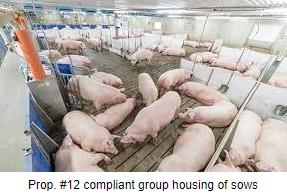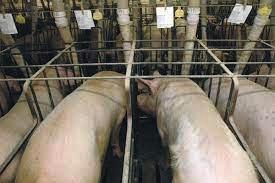 Representative Veronica Escobar (D-TX) has introduced H.R. 2939 the Pigs in Gestation Stalls (PIGS) Act of 2023. The objective would be to establish a Federal national standard for sow housing consistent with California Proposition #12 and Massachusetts Question 3. Following the SCOTUS ruling on the constitutionality of California Proposition #12, it would appear justifiable to consider a federal standard establishing a level playing field for the entire industry. Obviously, the PIGS Bill will be met with strong opposition from legislators representing hog-producing states. This ignores the reality that major packers and producers including Hormel, Smithfield Foods, Tyson Foods and Niman Ranch, the subsidiary of Perdue Foods have either committed to transition or have already complied with California Proposition #12. Although the SCOTUS decision upholding California and Massachusetts legislation enacted by ballot reflects a limited number of states, numerous customers represented by retail chains and restaurants have committed to sourcing pork compliant with Proposition #12.
Representative Veronica Escobar (D-TX) has introduced H.R. 2939 the Pigs in Gestation Stalls (PIGS) Act of 2023. The objective would be to establish a Federal national standard for sow housing consistent with California Proposition #12 and Massachusetts Question 3. Following the SCOTUS ruling on the constitutionality of California Proposition #12, it would appear justifiable to consider a federal standard establishing a level playing field for the entire industry. Obviously, the PIGS Bill will be met with strong opposition from legislators representing hog-producing states. This ignores the reality that major packers and producers including Hormel, Smithfield Foods, Tyson Foods and Niman Ranch, the subsidiary of Perdue Foods have either committed to transition or have already complied with California Proposition #12. Although the SCOTUS decision upholding California and Massachusetts legislation enacted by ballot reflects a limited number of states, numerous customers represented by retail chains and restaurants have committed to sourcing pork compliant with Proposition #12.
 It is ironic that the pork industry is now facing the possibility of a national standard given their intense lobbying against the “Egg Bill”. This would have established a national standard for housing of laying hens using enriched colony modules as the preferred alternative to conventional cages. Due to opposition by pork producers the Egg Bill was not incorporated into the 2018 Farm Bill. Subsequently egg producers have invested close to $4 billion to convert one-third of total production to aviaries, barns and free-range systems as alternatives to conventional cages. A University of Minnesota study estimated the cost to convert gestation crates to group housing to between $2 billion to $3 billion.
It is ironic that the pork industry is now facing the possibility of a national standard given their intense lobbying against the “Egg Bill”. This would have established a national standard for housing of laying hens using enriched colony modules as the preferred alternative to conventional cages. Due to opposition by pork producers the Egg Bill was not incorporated into the 2018 Farm Bill. Subsequently egg producers have invested close to $4 billion to convert one-third of total production to aviaries, barns and free-range systems as alternatives to conventional cages. A University of Minnesota study estimated the cost to convert gestation crates to group housing to between $2 billion to $3 billion.
It would appear that the pork industry has exhausted legal remedies and will be forced by law, customer demand and public sentiment to abandon gestation crates. Considerable expenditure on legal expenses, time and effort would have been saved had the pork industry recognized the writing on the wall and accepted the inevitability of change. They should have joined the egg sector in 2016 in crafting an acceptable national livestock housing standard.